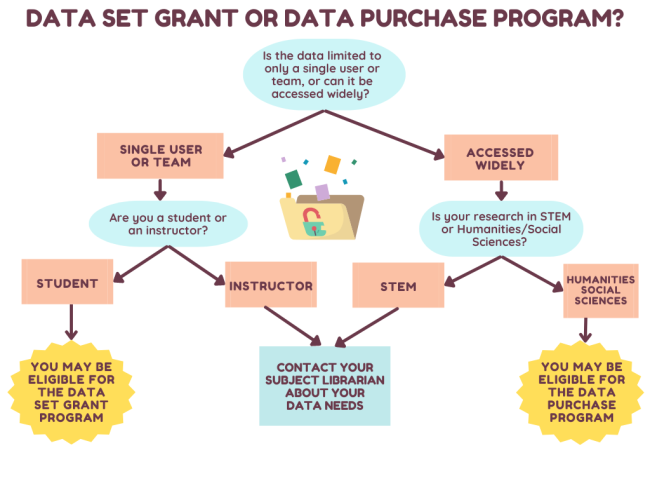Quick links:
- Research Data Management
- RCL Data Set Grant and Purchase Programs
- Data analysis & visualization
- Sharing Data
- Archival Collections & Manuscripts
- Accessing other University Collections
Research Data ManagementResearch Data Management (RDM) is the management of data used or created as part of the research life cycle. RDM aims to make the research process as efficient as possible. It helps meet expectations and requirements of the University, research funders, and legislation while also making research more accessible to the broader community.
Our data librarians can help manage your data more efficiently and comply with funder and publisher requirements for data management and sharing. Learn more about our services in this area and how you can get started. | |||||||||||||||
River Campus Libraries Data Set Grant and Purchase ProgramsThere are two programs that can assist students, faculty members, and other Rochester researchers obtain the datasets they need for their research: a Data Set Grant fund and a Social Sciences/Humanities Data Purchase Program. Use the following chart to determine which is the right one for you. 
If you have any questions on this diagram, or our data set programs, please contact Kathy Wu. For additional information on the criteria and processes for these funding opportunities, please look at the chart below. Undergraduate and graduate students can take advantage of either opportunity, while faculty members and other researchers are eligible only for the Data Purchase Program.
| |||||||||||||||
Data analysis & visualizationData analysis is a process of inspecting, cleansing, transforming, and modeling data. The River Campus Libraries offers resources to support this work from finding data to visualizing it. Finding Data Looking for publicly available and open-access data sets? Here are some good places to get started.
Not finding what you need? Your liaison librarian can help. We have access to a variety of discipline-specific datasets. You can also recommend a dataset for purchase or apply for our data grant. Cleaning Data Even when you find a good dataset, you may have to organize and clean it before you can begin your analysis. The library offers periodic workshops on tools, like OpenRefine, R, and Python that can help you easily clean your datasets. Check out the River Campus Libraries’ upcoming events to see what is being offered, and sign up. Data Modeling and Visualization The library also offers workshops that can help get you started with data visualization tools like Tableau. Check out the River Campus Libraries’ upcoming events to see what is being offered, and sign up. We also have resources to help with data science and statistics. Visit our data science guide to learn more. Data Citation It is important to cite data that you use. Managing citations can be cumbersome if you leave it to the last minute. Visit Data and statistics: Data Citation for everything you might need. You may also benefit from getting others to cite your data. By sharing your data in one of the resources below, you can increase the probability of your data being discovered and cited correctly.
| |||||||||||||||
Sharing DataOrganizing for Sharing Planning how you will organize your data in advance will make it easier to work with your data, share it, and preserve it. Librarians can offer advice regarding best practices for file-naming, persistent identifiers (such as DOIs), and version-controlling. To learn more about metadata and standards for various disciplines, visit the Understanding Metadata page. For examples about the type of support, go to Metadata Outreach – Project and Services. Depositing Data When you are ready to deposit your data, you have a few different options.
| |||||||||||||||
Archival Collections & ManuscriptsRiver Campus Libraries’ Archival Collections can be found in the Department of Rare Books, Special Collections, and Preservation (RBSCP). RBSCP holds the University’s unique, rare, and most important materials and collections, and they are home to the University Archives. Below are some useful links to help you get familiar with the RBSCP spaces:
| |||||||||||||||
Accessing Other University CollectionsThe University of Rochester also has great collections beyond the River Campus Libraries. Below are some useful links to access these collections.
Need an item Rochester doesn’t own? Interlibrary Loan connects our community to the nearly limitless resources of libraries across the globe. Follow these steps to request material. |

